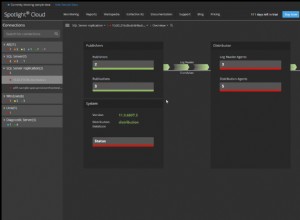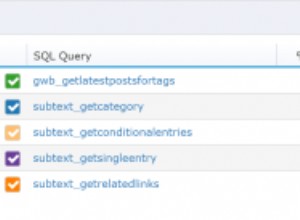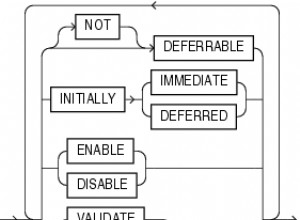Como solución alternativa, puede usar la marca de tiempo (antigua y nueva) para verificar que no actualizado cuando no hay cambios en la fila. (¿Posiblemente esa sea la fuente de confusión? Porque ese también se llama 'en actualización' pero no se ejecuta cuando no ocurre ningún cambio) Los cambios dentro de un segundo no ejecutarán esa parte del disparador, pero en algunos casos eso podría estar bien (como cuando tiene una aplicación que rechaza los cambios rápidos de todos modos).
Por ejemplo, en lugar de
IF NEW.a <> OLD.a or NEW.b <> OLD.b /* etc, all the way to NEW.z <> OLD.z */
THEN
INSERT INTO bar (a, b) VALUES(NEW.a, NEW.b) ;
END IF
podrías usar
IF NEW.ts <> OLD.ts
THEN
INSERT INTO bar (a, b) VALUES(NEW.a, NEW.b) ;
END IF
Entonces no tiene que cambiar su activador cada vez que actualice el esquema (el problema que mencionó en la pregunta).
EDITAR:Ejemplo completo agregado
create table foo (a INT, b INT, ts TIMESTAMP);
create table bar (a INT, b INT);
INSERT INTO foo (a,b) VALUES(1,1);
INSERT INTO foo (a,b) VALUES(2,2);
INSERT INTO foo (a,b) VALUES(3,3);
DELIMITER ///
CREATE TRIGGER ins_sum AFTER UPDATE ON foo
FOR EACH ROW
BEGIN
IF NEW.ts <> OLD.ts THEN
INSERT INTO bar (a, b) VALUES(NEW.a, NEW.b);
END IF;
END;
///
DELIMITER ;
select * from foo;
+------+------+---------------------+
| a | b | ts |
+------+------+---------------------+
| 1 | 1 | 2011-06-14 09:29:46 |
| 2 | 2 | 2011-06-14 09:29:46 |
| 3 | 3 | 2011-06-14 09:29:46 |
+------+------+---------------------+
3 rows in set (0.00 sec)
-- UPDATE without change
UPDATE foo SET b = 3 WHERE a = 3;
Query OK, 0 rows affected (0.00 sec)
Rows matched: 1 Changed: 0 Warnings: 0
-- the timestamo didnt change
select * from foo WHERE a = 3;
+------+------+---------------------+
| a | b | ts |
+------+------+---------------------+
| 3 | 3 | 2011-06-14 09:29:46 |
+------+------+---------------------+
1 rows in set (0.00 sec)
-- the trigger didn't run
select * from bar;
Empty set (0.00 sec)
-- UPDATE with change
UPDATE foo SET b = 4 WHERE a=3;
Query OK, 1 row affected (0.00 sec)
Rows matched: 1 Changed: 1 Warnings: 0
-- the timestamp changed
select * from foo;
+------+------+---------------------+
| a | b | ts |
+------+------+---------------------+
| 1 | 1 | 2011-06-14 09:29:46 |
| 2 | 2 | 2011-06-14 09:29:46 |
| 3 | 4 | 2011-06-14 09:34:59 |
+------+------+---------------------+
3 rows in set (0.00 sec)
-- and the trigger ran
select * from bar;
+------+------+---------------------+
| a | b | ts |
+------+------+---------------------+
| 3 | 4 | 2011-06-14 09:34:59 |
+------+------+---------------------+
1 row in set (0.00 sec)
Está funcionando debido al comportamiento de mysql en el manejo de las marcas de tiempo. La marca de tiempo solo se actualiza si se produjo un cambio en las actualizaciones.
La documentación está aquí:
https://dev .mysql.com/doc/refman/5.7/en/timestamp-initialization.html
desc foo;
+-------+-----------+------+-----+-------------------+-----------------------------+
| Field | Type | Null | Key | Default | Extra |
+-------+-----------+------+-----+-------------------+-----------------------------+
| a | int(11) | YES | | NULL | |
| b | int(11) | YES | | NULL | |
| ts | timestamp | NO | | CURRENT_TIMESTAMP | on update CURRENT_TIMESTAMP |
+-------+-----------+------+-----+-------------------+-----------------------------+




